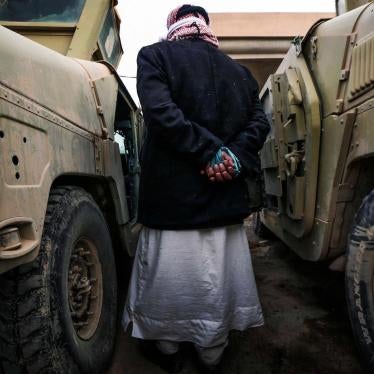You have to look long and hard these days to find good news on human rights in Egypt but we might take some encouragement from the decision on 14 April by the interim president, Adly Mansour, to send draft “counterterrorism” legislation back to the Justice Ministry for reconsideration.
The military-backed government announced in October that such legislation was in the works. The Interior Ministry, it seems, had already presented a draft bill to the cabinet in September 2013. [1] In early April this year, the cabinet approved a package comprising a new law and amendments to the penal code, with little public discussion, and sent them to Mansour for his widely-anticipated signature. We don’t know the president’s reasons for sending the legislation to the ministry—the entire process has been almost completely lacking in transparency.
It is not hard, though, to identify serious problems with what we know about the draft legislation: Egypt’s guardians of law and order appear to be trying to use it to short-circuit the obstacles in the new constitution to any renewed imposition of emergency rule. One can hope that Mansour, who sat as a judge on Egypt’s Supreme Constitutional Court from 1992 and was named to head the court in May 2013 before being tapped by the generals to serve as president, sees this threat.
Catch-All Language
First, the definition of terrorism is broad enough to capture any act that might ”obstruct” the work of public officials, institutions, universities, embassies and so on. Peaceful protests and workplace actions could fit that description. Another provision authorizes a prison sentence of up to ten years for anyone who aids or joins a group that “harms national unity” or “social peace”. Anyone who participated in the mass demonstrations in 2011 against the then president, Hosni Mubarak—or, for that matter, who joined the manifestations on 30 June last which prompted the army’s removal of his successor, Mohamed Morsy—might face prosecution under this catch-all language.
International experts have long urged Egypt to revoke the abusive features of its terrorism laws but its new rulers appear intent on extending them.
This problem is compounded by another amendment that would make it an offense to possess or disseminate any media (publication or recording) that appears to support anything falling under the disturbingly vague definition of terrorism. This could even apply to internet pages viewed and cached in a computer or smartphone.
A second issue is the escalating prescription of the death penalty. Under the draft legislation, anyone determined to be a leader—or “administrator”—of a group designated as terrorist would be subject to the death penalty. In late December the authorities so labeled the Muslim Brotherhood after an attack on a police headquarters in the Delta city of Mansoura, although as the US State Department noted the authorities did not provide “any substantiating evidence that the brotherhood was directly involved in this or any terrorist attacks that followed Morsy’s ouster”.[2] Potentially, under this provision a court could sentence Morsy and the group’s local office managers to death.
Thirdly, one of the draft penal code amendments allows authorities to hold a detainee without seeing a prosecutor or judge for 72 hours—three times the limit of the new constitution—and for this to be extended by a week. Under such conditions, detainees are most vulnerable to abuse and coerced confessions. In Washington recently, the foreign minister, Nabil Fahmy, extolled the constitution as “a very significant transformation, especially on issues of civil liberties” but had nothing to say about this proposed gutting of the document he claims to cherish.[3]
State of Emergency
Egyptian authorities have a history of promoting problematic counterterrorism legislation. The assassination in October 1981 of the then president, Anwar Sadat, brought his vice-president, Mubarak, to power, along with a declaration of a state of emergency (under Law 162/1958) which Mubarak renewed without interruption throughout his 30-year reign. Also in 1981, the Interior Ministry issued orders authorizing imprisonment of “anyone against whom there is credible evidence or is under suspicion of any activity that compromises public security or public order or threatens national unity or social stability”. In 1992, amid an armed Islamist insurgency, the government declared the Law to Combat Terrorism, which allowed for detention without referral to prosecutors of anyone affiliated with groups that sought “to suspend the constitution or laws, prevent state authorities from carrying out their duties, threaten personal or public liberties, or harm national unity or social peace”.[4] An estimated 15,000-20,000 persons were held without trial at any one time, some for as long as two decades.[5]
The authorities drafted counterterrorism legislation in 2006-07, ostensibly to replace the emergency law, but the legislation was never finalized or formally submitted for passage, apparently owing to resistance from the Interior and Defense ministries over proposed limits on the length of detention. One result was that the People’s Assembly, dominated by the then-ruling National Democratic Party, faithfully renewed the state of emergency every two years until Mubarak’s departure.
The provision in the new draft for extended detention without charge appears intended to incorporate into the penal code elements of the infamous emergency law. Authorities could thus get around the requirement in the new constitution that the parliament approve any declaration of a state of emergency, which would be limited to three months; renewal would require a two-thirds majority of the parliament. In November 2013, President Mansour issued a new public assembly law which also effectively replicates the highly restrictive provisions of the emergency law.[6]
Solid Recommendations
International experts have long urged Egypt to revoke the abusive features of its terrorism laws but its new rulers appear intent on extending them. In April 2009, at the invitation of the then government, the UN special rapporteur on the promotion and protection of human rights and fundamental freedoms while countering terrorism, Martin Scheinin, visited Egypt. Unfortunately the interim government has ignored the solid recommendations he made after examining the counter-terrorist provisions in the penal code and discussing the never-implemented draft legislation with Egyptian officials.
Scheinin expressed concern that the proposed legislation risked “attaching the stigma of terrorism” to acts that do not constitute violence against persons.[7] A law “not properly confined to the countering of terrorism”, Scheinin wrote, “weakens its own legitimacy” and “may unjustifiably restrict” exercise of the right to peaceful dissent.[8] He argued that detainees should have access to judicial review within 24 hours of arrest, “followed by regular and independent court review more often than once per week”.[9] And definitions of terrorist crimes “should be confined exclusively to activities that entail or are directly related to the use of deadly or serious violence against civilians”, Scheinin said, with criminal responsibility allocated to a group or its members only “on the basis of factual evidence of activities that are of a genuine terrorist nature as well as the actual involvement of the individuals concerned”.[10]
Egypt undeniably confronts a serious terrorism problem but the answer is certainly not to criminalize and stigmatize as terrorist all manner of public dissent and political opposition. Justice Ministry officials should consult Scheinin’s recommendations, as well as the 2009 Model Legislative Provisions Against Terrorism published by the UN Office on Drugs and Crime to assist states in establishing “a sound criminal justice-based response to terrorism”.[11] If they do so we can hope they will revise the worst provisions of the new legislation.
Joe Stork is deputy director of the Middle East and North Africa Division of Human Rights Watch.
[1] “Rights Organizations Warn that New Counter-Terrorism Law would Re-Establish Foundations of Police State and Intensify Violence and Terrorism”, Cairo Institute for Human Rights Studies, 7 November 2013
[2] US Department of State, Bureau of Counterterrorism, “Egypt”, Country Reports on Terrorism 2013, 30 April 2014. The Mansoura attack was claimed by the Sinai-based Ansar Bay al-Maqdis group.
[3] “Egypt’s Foreign Policy in New Realities”, Statesmen’s Forum with HE Nabil Fahmy, Center for Strategic and International Studies, Washington, DC, 28 April 2014, Federal News Service transcript
[4] The official name of Law 97/1992 is the Law Amending Some Provisions of the Penal Code, the Criminal Procedure Code, the Law Establishing the State Security Courts, the Law on Secrecy of Bank Accounts, and the Law on Weapons and Ammunition. For some of the provisions, see the Egypt chapter in Human Rights Watch, World Report 1996, p271.
[5] Human Rights Association for the Assistance of Prisoners, “Detention and Detainees in Egypt 2003” (Cairo, 2003), p18
[6] Human Rights Watch, “Egypt: Deeply Restrictive New Assembly Law”, 26 November 2013
[7] “Report of the Special Rapporteur on the promotion and protection of human rights and fundamental freedoms while countering terrorism, Martin Scheinin: Mission to Egypt”, Human Rights Council, 13th session, agenda item 3, 14 October 2009, advance edited version, A/HRC/13/37/Add.2, §14
[8] ibid, §16
[9] ibid, §17
[10] ibid, §50, 51
[11] UNODC, Terrorism Prevention Branch, “Model Legislative Provisions Against Terrorism”, February 2009






